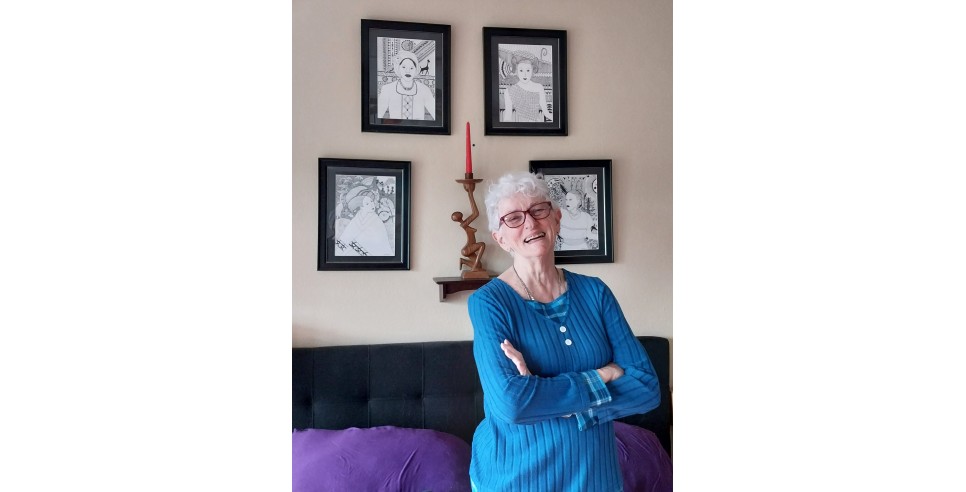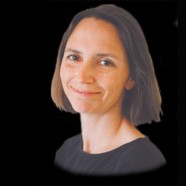
Retired Episcopal priest Carol Hosler served a parish in a small town in Arizona for many years before relocating to be closer to family. When she moved into a retirement community in Des Moines, Washington, a small waterfront town located halfway between the cities of Seattle and Tacoma, she brought some of the vibrancy of the Southwest with her. The artwork on her walls, the pottery on her shelves, and even the furniture bursts with colorful depictions of desert flora and fauna, and landscapes and portraits from her travels.
Even so, the bleakness of winter seemed to persist into springtime this year, and it wasn’t just because of the weather. When I met recently with Hosler and her fluffy cat, she told me she had been weighed down by the way things were moving in society: toward bitterness, blame, and disregard for the disenfranchised.
“But truth be told,” she said, stroking her cat, “I do believe the Holy Spirit has words for us – in church, and in meditation – and one day the message just came to me: No more sitting around.
“So, I called a bunch of friends, and 10 of them came.”
They gathered to share their concerns and then, instead of just “sitting around,” they came up with strategies for counteracting antipathy with compassion, justice, and joy. The results: a name for their group that spells out their intention, “Seniors for the Constitution,” along with a four-pronged action plan that encompasses the following:
- peaceful demonstrations
- letter and e-mail campaigns
- encouraging civil dialogue, and
- linking people who need help to available resources.
The group’s first effort was a campaign in March to send postcards to registered voters in Florida, encouraging them to exercise their right to vote in the special elections that were held in their state on April 1 to fill two empty Congressional seats. Voting consistently in elections prevents the state from deeming registered voters as “inactive” and removing their names from the registration rolls. Such purges have been identified by the nonpartisan Brennan Center for Justice as an overzealous strategy that has been increasingly promoted by far-right groups to disenfranchise large numbers of eligible voters.
The next time the Seniors for the Constitution met, 20 people came. And the time after that, 30 people showed up.
Meanwhile, word started circulating about the nationwide 50501movement to hold concurrent demonstrations on April 5 in big cities in each of the 50 states. The events would focus on what were perceived as the Trump administration’s most objectionable actions, including failing to observe due process procedures before deporting immigrants to foreign prisons, enabling the Department of Government Efficiency (aka Elon Musk’s “DOGE bros”) to eliminate longstanding government agencies, and the chaotic flip-flopping approach to tariffs.
But of course it turned out that it wasn’t just big-city folk who wanted to get in on these demonstrations. Folks in small towns were organizing, too – and in their own waterfront community of Des Moines, the Seniors for the Constitution were at the forefront of sponsoring an all-ages, accessible rally in Big Catch Plaza (which features a large bronze statue of a fisherman dancing with a large fish) at the entrance to town.
Hosler is no stranger to values-based demonstrations. As a seminary student on the East Coast in 1969, she participated with fellow students in a Mass for Peace held inside the Pentagon. Their group was arrested for “making undue noise” and briefly detained. When their case finally went to court, they were represented by the Episcopal bishops and found not guilty on appeal.
All these years later, Hosler is still a believer in active engagement. She and her fellow Seniors for the Constitution sent notices to the community blog, to social media sites, and their own expanding mailing list. (“We’re up to 350 e-mail addresses now!” Hosler says proudly.) They held a sign-making party. Some of them even had shirts printed up, with slogans like “Great-grandmas for due process.”
Then they hoped (and prayed, in some cases) for good weather on April 5th – and a reasonable turnout.
What transpired exceeded their expectations. After a long, gray, chilly Spring, the sun decided to come out in Des Moines on that first Saturday in April. So did over 500 demonstrators. There were babies in strollers, nonagenarians in wheelchairs, and everyone in between. People packed into the flower-bedecked plaza and spread along the sidewalks down either side of the street. The mood was upbeat, and the sign-waving and chants of the participants were met mostly with cheerful horn honks and thumbs-up from folks in the cars passing by. (Demonstrators responded to the much rarer “middle-finger salute” by shrugging good-naturedly, or even blowing kisses.)
The Seniors for the Constitution group plans to continue demonstrating at Big Catch Plaza on the first and third Saturdays of every month from 1-2 PM to advocate for “the least, the last, and the lost” – a phrase Hosler borrowed from the late Robert Farrar Capon, who also had been an Episcopal priest.
The group is also organizing what Hosler calls a “trial run” of an event that will advance their third goal – to promote the civil exchange of ideas. They’re inviting people who are interested in having conversations around big ideas. The plan is to bring them all together and provide guidelines for careful listening and thoughtful responding. They’ll suggest possible topics to address. Then they’ll seat people across tables from each other, and let them have one-on-one conversations. In this case, “sitting around” is desirable, provided the interlocutors take the time really to pay attention to one another.
It remains to be seen if the outcomes are revelatory for participants, but Hosler is optimistic. To understand other people, she says, “you have to get curious about how others come to believe what they do.”
While she may be a retired clergy member, her faith in the Golden Rule remains strong. When asked for parting advice on how to do good in the world, she replies with a smile, “Do unto others as you would have them do unto you.”
Barbara Lloyd McMichael is a freelance writer living in the Pacific Northwest.









